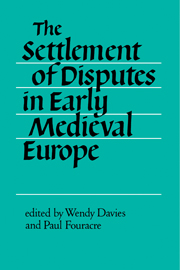Book contents
- Frontmatter
- Contents
- List of figures
- Preface
- Abbreviations
- Introduction
- 1 Disputes in late fifth- and sixth-century Gaul: some problems
- 2 ‘Placita’ and the settlement of disputes in later Merovingian Francia
- 3 Dispute settlement in Carolingian West Francia
- 4 People and places in dispute in ninth-century Brittany
- 5 Visigothic law and regional custom in disputes in early medieval Spain
- 6 Land disputes and their social framework in Lombard–Carolingian Italy, 700–900
- 7 Dispute settlement in the Byzantine provinces in the tenth century
- 8 Charters, law and the settlement of disputes in Anglo-Saxon England
- 9 Dispute settlement in medieval Ireland: a preliminary inquiry
- 10 An early modern postscript: the Sandlaw dispute, 1546
- Conclusion
- Appendix texts of the documents discussed
- Glossary
- List of works cited
- Index
5 - Visigothic law and regional custom in disputes in early medieval Spain
Published online by Cambridge University Press: 11 January 2010
- Frontmatter
- Contents
- List of figures
- Preface
- Abbreviations
- Introduction
- 1 Disputes in late fifth- and sixth-century Gaul: some problems
- 2 ‘Placita’ and the settlement of disputes in later Merovingian Francia
- 3 Dispute settlement in Carolingian West Francia
- 4 People and places in dispute in ninth-century Brittany
- 5 Visigothic law and regional custom in disputes in early medieval Spain
- 6 Land disputes and their social framework in Lombard–Carolingian Italy, 700–900
- 7 Dispute settlement in the Byzantine provinces in the tenth century
- 8 Charters, law and the settlement of disputes in Anglo-Saxon England
- 9 Dispute settlement in medieval Ireland: a preliminary inquiry
- 10 An early modern postscript: the Sandlaw dispute, 1546
- Conclusion
- Appendix texts of the documents discussed
- Glossary
- List of works cited
- Index
Summary
The Visigothic Forum Iudicum enjoyed quite exceptional longevity as a code of law put to practical application. Although the geographical range of its authority steadily declined after the eleventh century, it remained the sole comprehensive work of legal codification with more than local relevance from its promulgation in the mid-seventh century to its final replacement by Alfonso X's Siete Partidas in the late thirteenth: a span of over six hundred years. Even in its final phase it is its intended practical applicability that is most striking: Alfonso X's father granted the use of the vernacular version, the Fuero Juzgo as the local law and privilege of recently reconquered Córdoba and Seville. It is as if the Laws of Alfred were still enjoying validity in the reign of Henry VII.
Admittedly, by this stage the Forum had ceased to be enforced in Castille and in Catalonia, and was generally elsewhere supplemented and modified by the proliferation of local fueros. But for a code devised so long previously and in so distant a society the survival and continuing authority of the Forum (also known as Lex Visigothorum) is remarkable. The processes of its modification were also, as far as the evidence can now show us, of relatively recent date, beginning only in the middle of the eleventh century. Indeed the two hundred years before that may well be described as the hey-day of the Forum Iudicum, particularly in terms of our knowledge of how it was applied in practice.
- Type
- Chapter
- Information
- The Settlement of Disputes in Early Medieval Europe , pp. 85 - 104Publisher: Cambridge University PressPrint publication year: 1986
- 20
- Cited by

